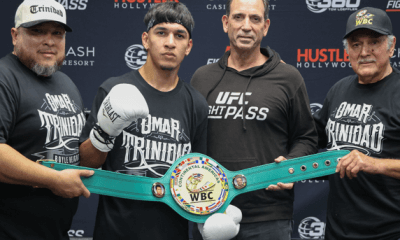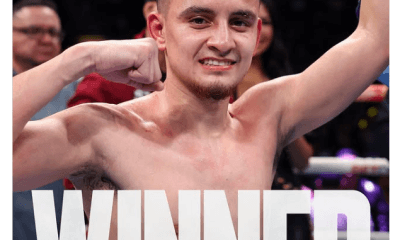Featured Articles
Looking back at the Topsy-Turvy Life of Mike Tyson Who Turns 51 This Week
With the possible exception of the immortal Muhammad Ali, it seems that more words have been written about Mike Tyson than any other boxer.
And that’s saying a mouthful given the thousands upon thousands of young men with colorful stories and pasts that have stepped into the ring.
Tyson, who will celebrate his 51st birthday on June 30, has been on top of the mountain and in the basement during a professional career that spanned two decades.
At his very best, Tyson was one of the most feared and explosive punchers ever, reminiscent of such sluggers as Joe Louis, Rocky Marciano and George Foreman.
And he also reached the very lowest depths a man can face, including inner-doubt and self-loathing.
Tyson’s nadir was being convicted of raping Desiree Washington, an 18-year-old beauty pageant contestant.
For his punishment, Tyson was handed a six-year prison sentence, but spent slightly less than three years incarcerated.
When asked recently on a sports talk radio show publicizing his latest book “Iron Ambition: My Life With Cus D’Amato” co-authored with Larry Sloman, what year stood out with regard to partying, Tyson quipped, “Nineteen eighty-nine was a really good year.”
Everybody laughed. Tyson didn’t explain, but didn’t need to. We knew exactly what he meant. Early on, one could have predicted that Tyson’s future wasn’t going to be trading stocks and bonds on Wall Street.
For Tyson, the Brooklyn native, simply waking up every morning and still in one piece was an accomplishment.
From the very beginning, with little or no guidance from his delinquent father and overwrought mother, Tyson was a wayward kid, walking the tough and nasty streets of Brownsville, acting like a thug, always getting into trouble.
“I never saw my mother happy with me and proud of me for doing something,” Tyson said of his late mother Lorna Mae. “She knew me as being a wild kid running in the streets, coming home with brand new clothes that she knew I didn’t pay for. I never got a chance to talk to her or know her. Professionally, it has no affect, but it’s crushing emotionally and personally.”
Remarkably, before Tyson turned 13 years old, he had been arrested 38 times.
Once while driving around his old haunt in Brooklyn, he told his then wife, the actress, Robin Givens, “see that corner right over there? That’s where I once beat up a guy.”
To which Givens replied: “Mike, stop saying those awful things. Those were in the past. That’s not you.”
Only to have Tyson retort: “But it is me, only now I’m the heavyweight champion of the world.”
Tyson would often brag about being a ruffian and even told stories about helping little “old ladies” carry their groceries to their apartments, only to knock the lady on her fanny and take the goods for himself.
Tyson was simply too much to handle and was sent to the Tryon School For Boys.
It was there that he met Bobby Stewart, a counselor and one-time boxer, who later introduced Tyson to the legendary trainer D’Amato.
D’Amato was at the same time a genius and also paranoid, helping build a shy and introverted Floyd Patterson into at the time the youngest heavyweight champion and turn Jose Torres into the light heavyweight title holder.
“If you don’t learn to control fear, it’ll destroy you and everything around,” D’Amato famously said to Tyson and the others who came before him.
After seeing Tyson, with his powerful punches and perfect head movement, the old man predicted that he would someday be the heavyweight champion.
In time, D’Amato and his lady friend Camille Ewald, would take in Tyson and teach him table manners and instill the importance of getting good grades.
It was in Catskill, New York, that Tyson, in a training camp atmosphere would learn the tricks of the trade from D’Amato, Kevin Rooney and Teddy Atlas.
“Cus would give me confidence,” said Tyson of his first trainer.” I didn’t know what he was talking about. You’re going to be champion of the world. At first I thought he was crazy. But the more I thought about what he was saying, it made sense.”
During Tyson’s salad days, I had friends who were not fight fans per se, but after witnessing him set the heavyweight division on its proverbial ear, became fight fans.
Rather, Tyson fans, if only to see the 5-foot-10 bulldozer knock out whoever was placed in front of him.
Tyson, who had 58 professional fights, winning 50, losing six with two no contests and 44 knockouts, would indeed fulfill D’Amato’s prophecy and become the youngest heavyweight champion ever.
It happened on November 22, 1986, at the Las Vegas Hilton when Tyson earned a technical knockout win over Trevor Berbick in the second round for the World Boxing Council belt.
Four months later, Tyson would add the World Boxing Association crown by defeating James “Bonecrusher” Smith in a unanimous decision and five months later outpoint Tony Tucker on all three judges’ scorecards for the International Boxing Federation title.
Tyson seemingly had it all. The three heavyweight belts and all the money and fame he would ever need. Or so we thought.
While Tyson finally had something to be truly proud of, D’Amato never saw any of it because he passed away in November 1985.
These were exciting times for boxing and especially the heavyweight division in large part because of Tyson.
When Tyson reigned as the king of the division, he made it a throw-back era in which the gladiator came out of his dressing room as a stark figure, attired in black trunks, sock-less and in black high-top shoes.
There was more in store for Tyson, who reached his high-water mark on the night of June 27, 1988, at the Atlantic City Convention Hall.
It took all of 91 seconds for Tyson to knock out Michael Spinks.
Afterward, Spinks tried to explain what happened. “I’m a fighter. It’s what I do,” he told the assembled media that included the Newark Star-Ledger’s Jerry Izenberg. “I tried to take a shot, but I came up short. Fear was knocking at my door big time.”
Tyson’s road to stardom started innocently after taking out Hector Mercedes in the opening round via TKO in Albany, New York, on March 6, 1985.
Over time, 36 others would also be found on the short end, including 17 whose evening ended in the initial frame.
Without the need to brag, Tyson was indeed, the “baddest man on the planet,” and was feared by everyone in the division, except maybe one.
That was James “Buster” Douglas, who in February 1990, at the Tokyo Dome and a 42-1 underdog, unbelievably decked Tyson in the 10th round.
How could this have happened? To Tyson? The longtime boxing analyst Howard Cosell, who helped make Ali because of television, said Tyson could be beat. “You need to stick and move and keep away from him,” Cosell intoned.
Well that’s what the 6-foot-4 Douglas did. He kept his distance, jabbed when necessary and unleashed stinging rights.
After that debacle, Tyson righted the ship and reeled off eight straight victories before facing Evander Holyfield in November 1996 at the MGM Grand Garden Arena with the WBA, WBC and IBF belts on the line.
In a fierce battle, Holyfield earned a TKO victory in the 11th round. A rematch was needed and took place seven months later at the same venue.
But instead of it being remembered as a classic, it is known as the night Tyson lost his cool and bit a piece of Holyfield’s ear off and was disqualified in the third round by Mills Lane, the referee.
Tyson was no longer feared, but was still extremely dangerous. In a lopsided loss against Lennox Lewis at The Pyramid, in Memphis, Tennessee, in June 2002, “Kid Dynamite,” as Sports Illustrated once dubbed Tyson, was savagely pushed around by the much taller and better boxer that ended with an eighth-round knockout.
After earning a win, Tyson then closed out his time in the ring with consecutive setbacks to journeymen Danny Williams and Kevin McBride.
On one of my sojourns to Las Vegas a few years ago for a Saturday fight card at the MGM, I happened to be sitting ringside next to Harold Lederman for a Friday event at the Tropicana Hotel.
Early in the proceedings, I noticed a boy, probably 12 years old with boxing gloves and pen in hand walking toward Tyson and his wife Lakiha.
In short order, Tyson saw the boy, took the gloves, signed them and wished the youngster a good night. I leaned over and told Lederman that was a nice gesture and he agreed.
When Tyson began his storied career with Rooney in his corner, the Brownsville Bomber was practically unbeatable.
With the passing of D’Amato and Jimmy Jacobs, followed by Rooney and Atlas eventually cutting ties with the former undisputed heavyweight champion, Tyson’s life was in shambles.
Tyson has done some nice projects since retiring in 2005 including a one-man show, had a documentary done on his life and has appeared on television.
All of this is fine, but for me, Tyson’s last great gesture was being a pallbearer at Ali’s funeral.
Because even if only for a few minutes, the “Iron Mike” we all knew was back on top.
Check out more boxing news on video at The Boxing Channel

-

 Featured Articles3 weeks ago
Featured Articles3 weeks agoThe Hauser Report: Zayas-Garcia, Pacquiao, Usyk, and the NYSAC
-

 Featured Articles2 weeks ago
Featured Articles2 weeks agoOscar Duarte and Regis Prograis Prevail on an Action-Packed Fight Card in Chicago
-

 Featured Articles1 week ago
Featured Articles1 week agoThe Hauser Report: Cinematic and Literary Notes
-

 Book Review4 days ago
Book Review4 days agoMark Kriegel’s New Book About Mike Tyson is a Must-Read
-

 Featured Articles4 weeks ago
Featured Articles4 weeks agoManny Pacquiao and Mario Barrios Fight to a Draw; Fundora stops Tim Tszyu
-

 Featured Articles4 weeks ago
Featured Articles4 weeks agoArne’s Almanac: Pacquiao-Barrios Redux
-

 Featured Articles3 weeks ago
Featured Articles3 weeks agoRemembering Dwight Muhammad Qawi (1953-2025) and his Triumphant Return to Prison
-

 Featured Articles4 weeks ago
Featured Articles4 weeks agoOleksandr Usyk Continues to Amaze; KOs Daniel Dubois in 5 One-Sided Rounds


















